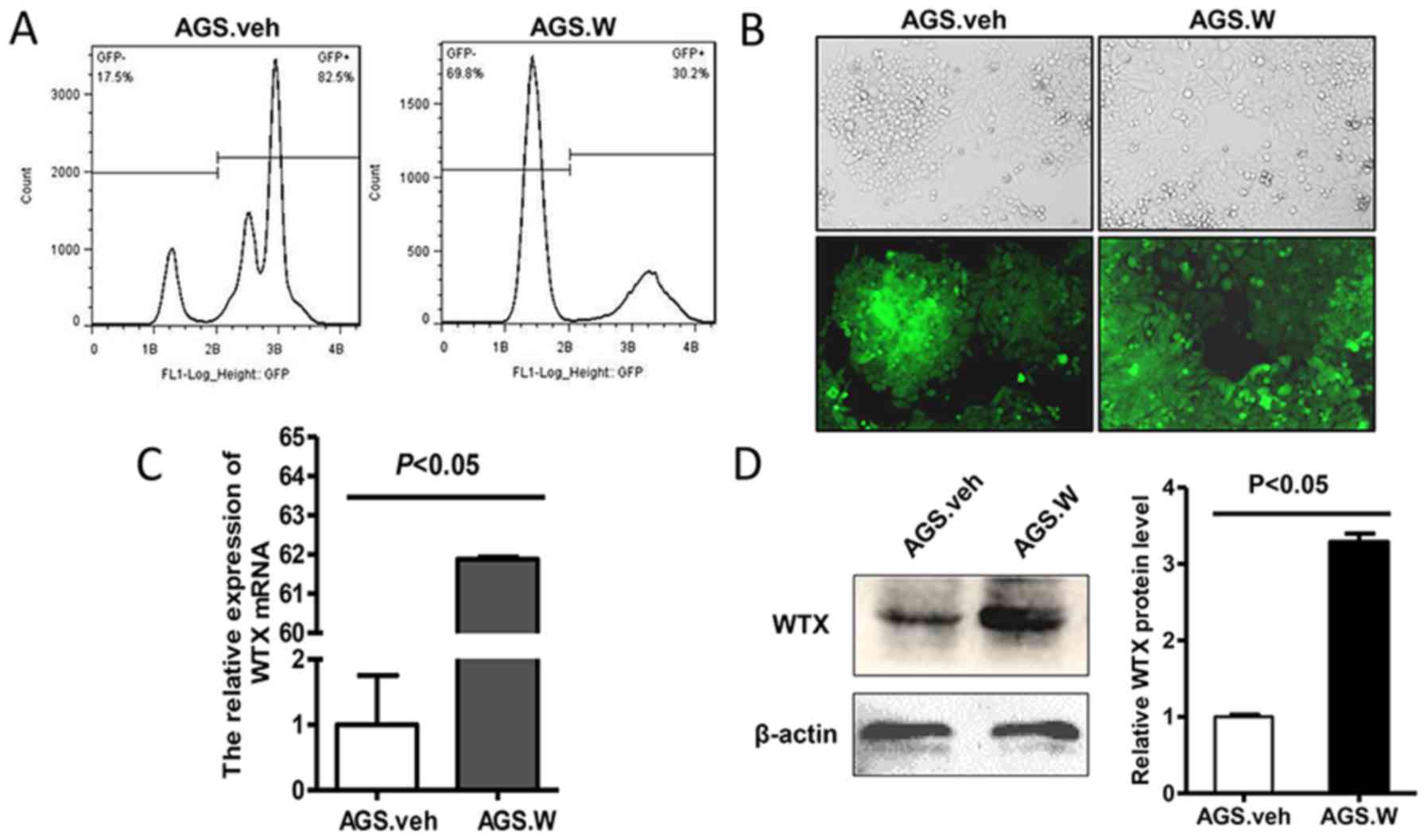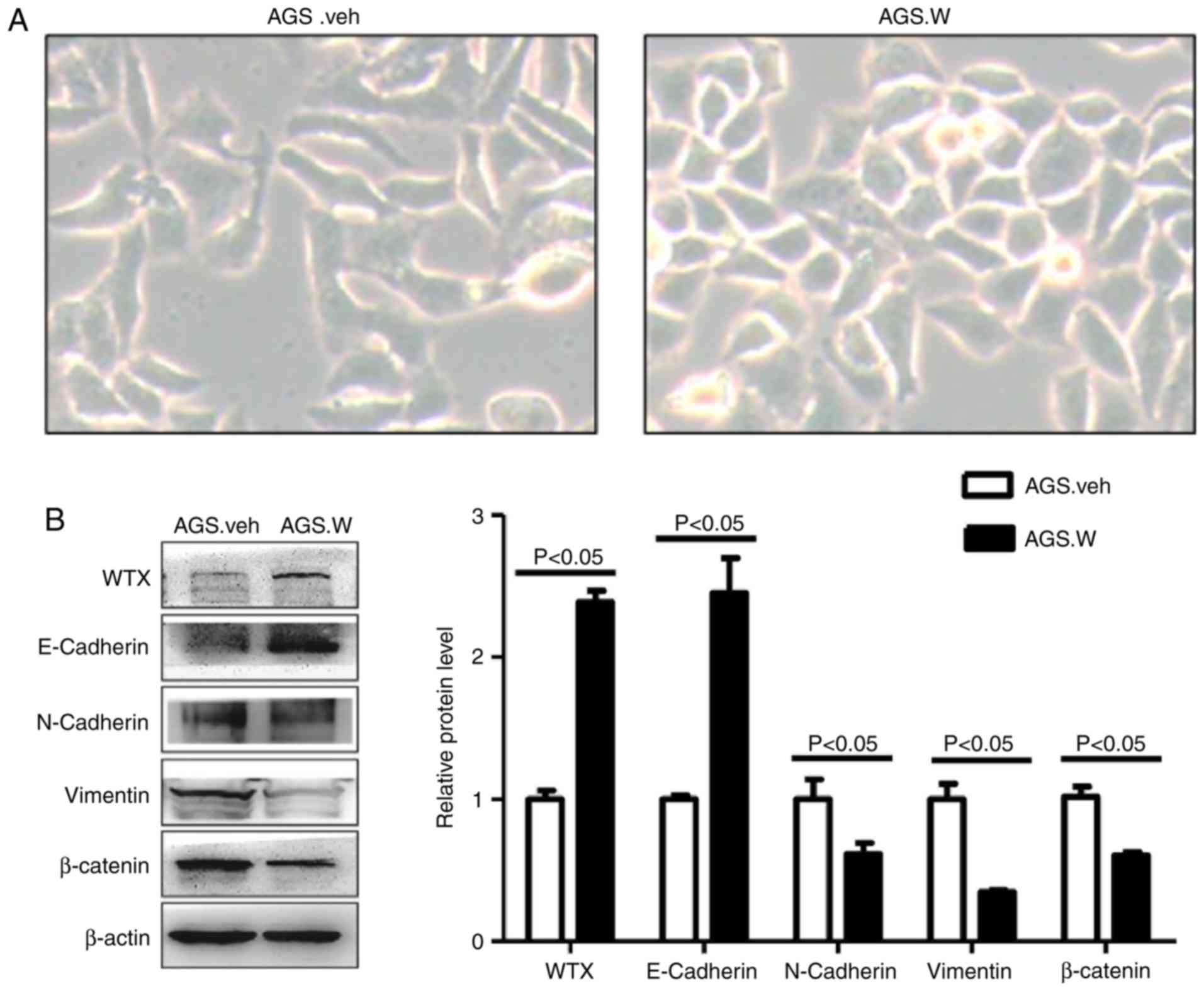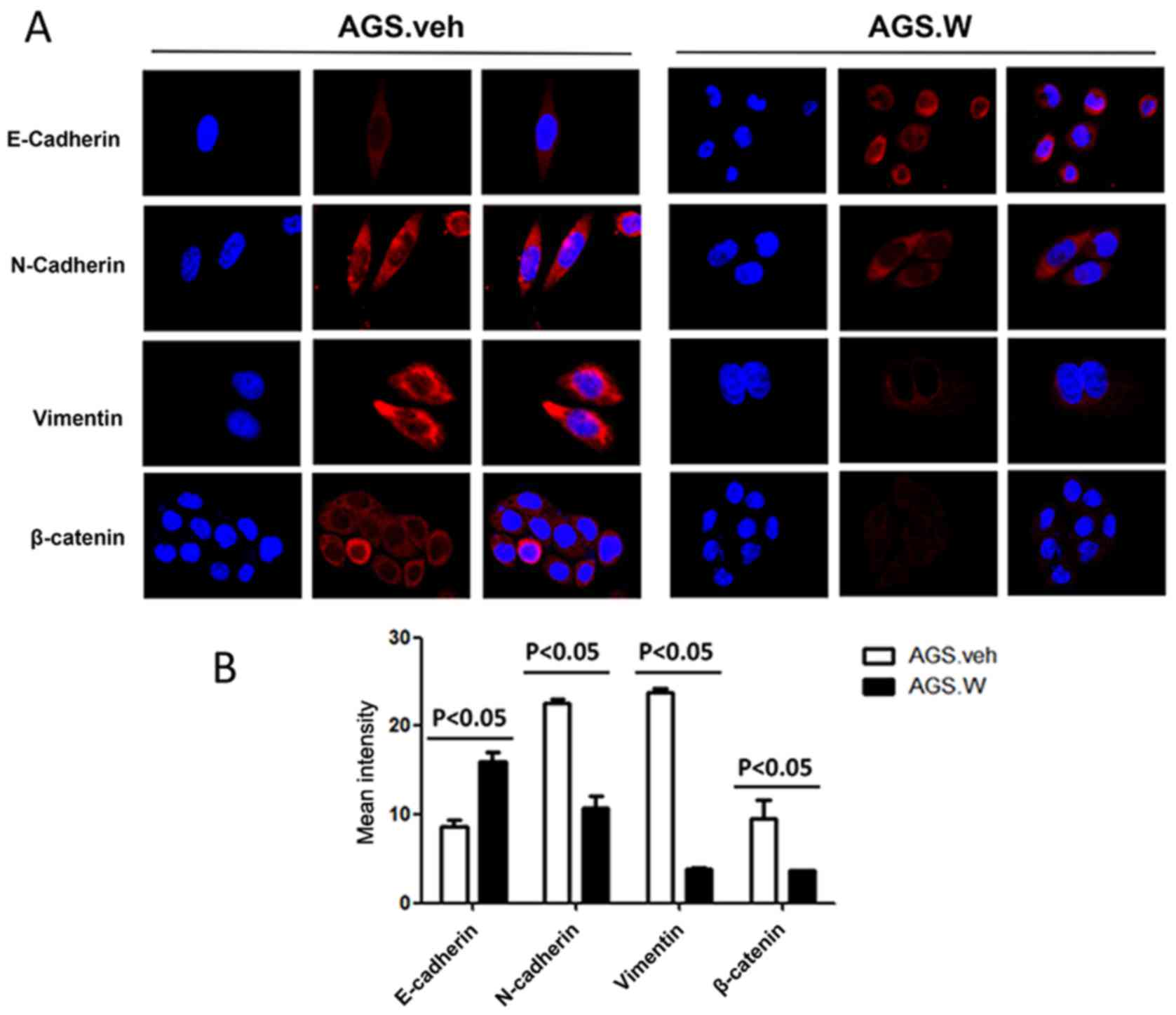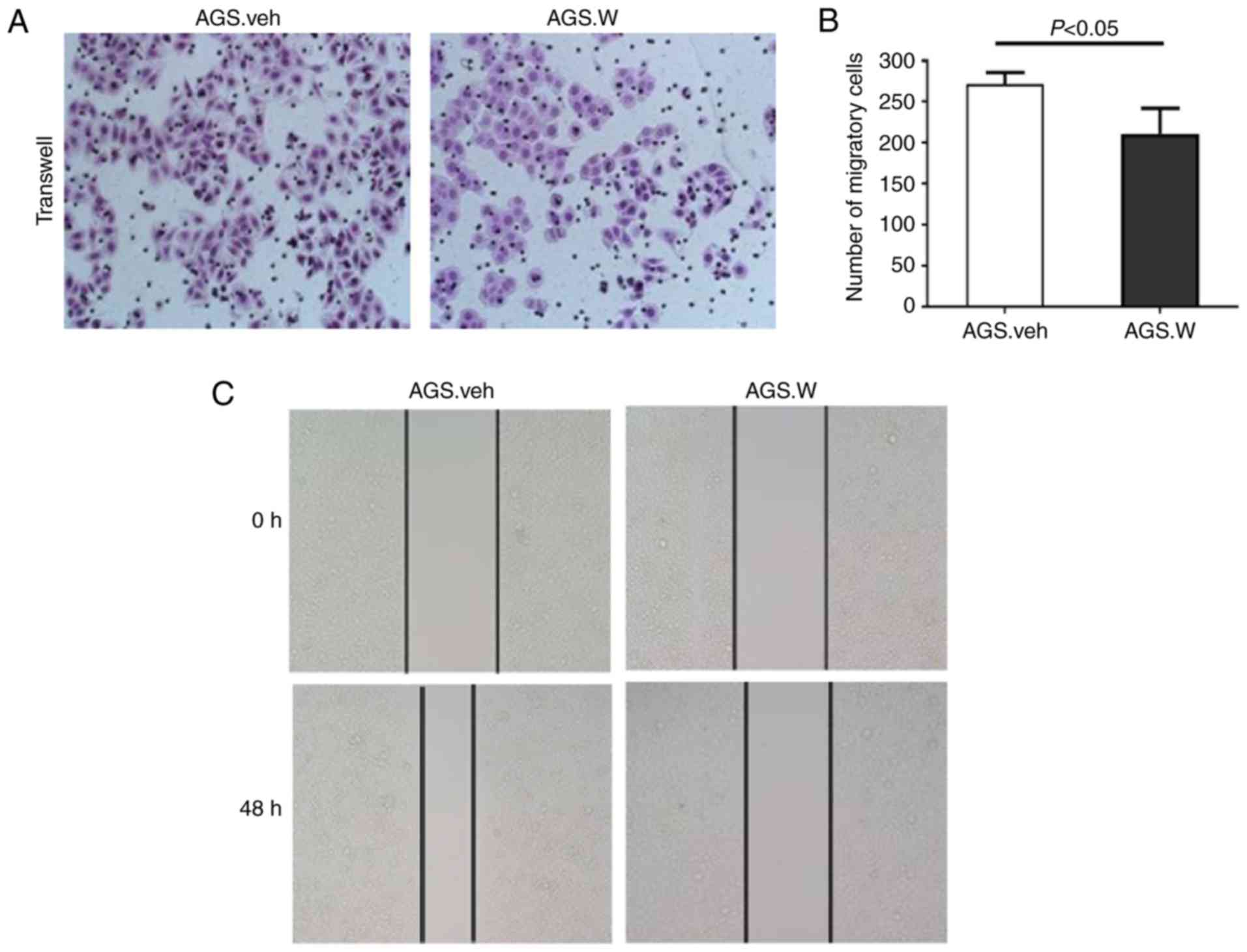|
1
|
Torre LA, Bray F, Siegel RL, Ferlay J,
Lortet-Tieulent J and Jemal A: Global cancer statistics, 2012. CA
Cancer J Clin. 65:87–108. 2015. View Article : Google Scholar : PubMed/NCBI
|
|
2
|
Li J, Zhen L, Zhang Y, Zhao L, Liu H, Cai
D, Chen H, Yu J, Qi X and Li G: Circ-104916 is downregulated in
gastric cancer and suppresses migration and invasion of gastric
cancer cells. Onco Targets Ther. 10:3521–3529. 2017. View Article : Google Scholar : PubMed/NCBI
|
|
3
|
Zhang P, Tang WM, Zhang H, Li YQ, Peng Y,
Wang J, Liu GN, Huang XT, Zhao JJ, Li G, et al: MiR-646 inhibited
cell proliferation and EMT-induced metastasis by targeting FOXK1 in
gastric cancer. Br J Cancer. 117:525–534. 2017. View Article : Google Scholar : PubMed/NCBI
|
|
4
|
Bang YJ, Van Cutsem E, Feyereislova A,
Chung HC, Shen L, Sawaki A, Lordick F, Ohtsu A, Omuro Y, Satoh T,
et al: Trastuzumab in combination with chemotherapy versus
chemotherapy alone for treatment of HER2-positive advanced gastric
or gastro-oesophageal junction cancer (ToGA): A phase 3,
open-label, randomised controlled trial. Lancet. 376:687–697. 2010.
View Article : Google Scholar : PubMed/NCBI
|
|
5
|
Legras A, Pecuchet N, Imbeaud S, Pallier
K, Didelot A, Roussel H, Gibault L, Fabre E, Le Pimpec-Barthes F,
Laurent-Puig P and Blons H: Epithelial-to-mesenchymal transition
and MicroRNAs in lung cancer. Cancers (Basel). 9(pii): E1012017.
View Article : Google Scholar : PubMed/NCBI
|
|
6
|
Kalluri R and Weinberg RA: The basics of
epithelial-mesenchymal transition. J Clin Invest. 119:1420–1428.
2009. View
Article : Google Scholar : PubMed/NCBI
|
|
7
|
He SJ, Xiang CQ, Zhang Y, Lu XT, Chen HW
and Xiong LX: Recent progress on the effects of microRNAs and
natural products on tumor epithelial-mesenchymal transition. Onco
Targets Ther. 10:3435–3451. 2017. View Article : Google Scholar : PubMed/NCBI
|
|
8
|
Thiery JP, Acloque H, Huang RY and Nieto
MA: Epithelial-mesenchymal transitions in development and disease.
Cell. 139:871–890. 2009. View Article : Google Scholar : PubMed/NCBI
|
|
9
|
Qiao Y, Jiang X, Lee ST, Karuturi RK, Hooi
SC and Yu Q: FOXQ1 regulates epithelial-mesenchymal transition in
human cancers. Cancer Res. 71:3076–3086. 2011. View Article : Google Scholar : PubMed/NCBI
|
|
10
|
Zeisberg M and Neilson EG: Biomarkers for
epithelial-mesenchymal transitions. J Clin Invest. 119:1429–1437.
2009. View
Article : Google Scholar : PubMed/NCBI
|
|
11
|
De Craene B and Berx G: Regulatory
networks defining EMT during cancer initiation and progression. Nat
Rev Cancer. 13:97–110. 2013. View
Article : Google Scholar : PubMed/NCBI
|
|
12
|
Zhang J, Zhou Y and Yang Y: CCR7 pathway
induces epithelial-mesenchymal transition through up-regulation of
Snail signaling in gastric cancer. Med Oncol. 32:4672015.PubMed/NCBI
|
|
13
|
Liu AN, Zhu ZH, Chang SJ and Hang XS:
Twist expression associated with the epithelial-mesenchymal
transition in gastric cancer. Mol Cell Biochem. 367:195–203. 2012.
View Article : Google Scholar : PubMed/NCBI
|
|
14
|
Huang L, Wu RL and Xu AM:
Epithelial-mesenchymal transition in gastric cancer. Am J Transl
Res. 7:2141–2158. 2015.PubMed/NCBI
|
|
15
|
Jia LT, Wu J, Zhang L, Chen J, Zhong D, Xu
S, Xie C and Cai J: Restoration of miR-1228* expression suppresses
epithelial-mesenchymal transition in gastric cancer. PLoS One.
8:e586372013. View Article : Google Scholar : PubMed/NCBI
|
|
16
|
Liu S, Cui J, Liao G, Zhang Y, Ye K, Lu T,
Qi J and Wan G: miR-137 regulates epithelial-mesenchymal transition
in gastrointestinal stromal tumor. Tumor Biol. 35:9131–9138. 2014.
View Article : Google Scholar
|
|
17
|
Sakimura S, Kurashige J, Sugimachi K, Ueda
M, Hirata H, Shinden Y, Sakimura E, Matsumura T, Takano Y, Uchi R,
et al: Decreased expression of miR-506 induced
epithelial-mesenchymal transition and poor prognosis in gastric
cancer patients. Cancer Res. 74:2014. View Article : Google Scholar
|
|
18
|
Rivera MN, Kim WJ, Wells J, Driscoll DR,
Brannigan BW, Han M, Kim JC, Feinberg AP, Gerald WL, Vargas SO, et
al: An X chromosome gene, WTX, is commonly inactivated in Wilms
tumor. Science. 315:642–645. 2007. View Article : Google Scholar : PubMed/NCBI
|
|
19
|
Akhavanfard S, Vargas SO, Han M, Nitta M,
Chang CB, Le LP, Fazlollahi L, Nguyen Q, Ma Y, Cosper A, et al:
Inactivation of the tumor suppressor WTX in a subset of pediatric
tumors. Genes Chromosomes Cancer. 53:67–77. 2014. View Article : Google Scholar : PubMed/NCBI
|
|
20
|
Kim WJ, Wittner BS, Amzallag A, Brannigan
BW, Ting DT, Ramaswamy S, Maheswaran S and Haber DA: The WTX tumor
suppressor interacts with the transcriptional corepressor TRIM28. J
Biol Chem. 290:14381–14390. 2015. View Article : Google Scholar : PubMed/NCBI
|
|
21
|
Qing Ling Z, LiNa Y, Li L, Shuang W,
YuFang Y, Yi D, Divakaran J, Xin L and YanQing D: LMP1 antagonizes
WNT/β-catenin signalling through inhibition of WTX and promotes
nasopharyngeal dysplasia but not tumourigenesis in LMP1(B95-8)
transgenic mice. J Pathol. 223:574–583. 2011. View Article : Google Scholar : PubMed/NCBI
|
|
22
|
Fujita A, Ochi N, Fujimaki H, Muramatsu H,
Takahashi Y, Natsume J, Kojima S, Nakashima M, Tsurusaki Y, Saitsu
H, et al: A novel WTX mutation in a female patient with osteopathia
striata with cranial sclerosis and hepatoblastoma. Am J Med Genet
A. 164A:1–1002. 2014.PubMed/NCBI
|
|
23
|
Zhang YY, Wang QM, Niu HL, Liu X and Zhang
QL: The general expression analysis of WTX gene in normal and
cancer tissues. Pathol Oncol Res. 23:439–446. 2017. View Article : Google Scholar : PubMed/NCBI
|
|
24
|
Ma W, He L, Liu C, Zhang Q and Ding Y:
Establishment of a colorectal cancer SW620 cell line stably
over-expressing Wilm's tumor on X chromosome using a recombinant
lentivirus vector. Nan Fang Yi Ke Da Xue Xue Bao. 35:1122–1127.
2015.(In Chinese). PubMed/NCBI
|
|
25
|
Livak KJ and Schmittgen TD: Analysis of
relative gene expression data using real-time quantitative PCR and
the 2(-Delta Delta C(T)) method. Methods. 25:402–408. 2001.
View Article : Google Scholar : PubMed/NCBI
|
|
26
|
Xu J, Lamouille S and Derynck R:
TGF-beta-induced epithelial to mesenchymal transition. Cell Res.
19:156–172. 2009. View Article : Google Scholar : PubMed/NCBI
|
|
27
|
Wendt MK, Allington TM and Schiemann WP:
Mechanisms of the epithelial-mesenchymal transition by TGF-beta.
Future Oncol. 5:1145–1168. 2009. View Article : Google Scholar : PubMed/NCBI
|
|
28
|
Wu C, Zhuang Y, Jiang S, Liu S, Zhou J, Wu
J, Teng Y, Xia B, Wang R and Zou X: Interaction between
Wnt/β-catenin pathway and microRNAs regulates
epithelial-mesenchymal transition in gastric cancer (Review). Int J
Oncol. 48:2236–2246. 2016. View Article : Google Scholar : PubMed/NCBI
|
|
29
|
Camargo MC, Kim WH, Chiaravalli AM, Kim
KM, Corvalan AH, Matsuo K, Yu J, Sung JJ, Herrera-Goepfert R,
Meneses-Gonzalez F, et al: Improved survival of gastric cancer with
tumour Epstein-Barr virus positivity: An international pooled
analysis. Gut. 63:236–243. 2014. View Article : Google Scholar : PubMed/NCBI
|
|
30
|
Deng JY and Liang H: Clinical significance
of lymph node metastasis in gastric cancer. World J Gastroenterol.
20:3967–3975. 2014. View Article : Google Scholar : PubMed/NCBI
|
|
31
|
Martinez Mier G, Alvarez-Tostado Fernandez
JF, Romero Hernandez T, Martinez Mier EA and Blanco Benavides R:
Morbidity and mortality in surgery for gastric cancer. Rev
Gastroenterol Mex. 64:78–84. 1999.(In Spanish). PubMed/NCBI
|
|
32
|
Comai G, Boutet A, Neirijnck Y and Schedl
A: Expression patterns of the Wtx/Amer gene family during mouse
embryonic development. Dev Dyn. 239:1867–1878. 2010. View Article : Google Scholar : PubMed/NCBI
|
|
33
|
Xia P and Xu XY: Epithelial-mesenchymal
transition and gastric cancer stem cell. Tumour Biol. 39:2017.
View Article : Google Scholar
|
|
34
|
Huang J, Xiao D, Li G, Ma J, Chen P, Yuan
W, Hou F, Ge J, Zhong M, Tang Y, et al: EphA2 promotes
epithelial-mesenchymal transition through the Wnt/β-catenin pathway
in gastric cancer cells. Oncogene. 33:2737–2747. 2014. View Article : Google Scholar : PubMed/NCBI
|
|
35
|
Li K and Dan Z: Research progress of
Wnt/β-catenin signaling pathway in prevention and treatment of
gastric cancer. Nan Fang Yi Ke Da Xue Xue Bao. 34:1852–1856.
2014.(In Chinese). PubMed/NCBI
|
|
36
|
Heuberger J and Birchmeier W: Interplay of
cadherin-mediated cell adhesion and canonical Wnt signaling. Cold
Spring Harb Perspect Biol. 2:a0029152010. View Article : Google Scholar : PubMed/NCBI
|
|
37
|
Howard S, Deroo T, Fujita Y and Itasaki N:
A positive role of cadherin in Wnt/β-catenin signalling during
epithelial-mesenchymal transition. PLoS One. 6:e238992011.
View Article : Google Scholar : PubMed/NCBI
|
|
38
|
Hlubek F, Jung A, Kotzor N, Kirchner T and
Brabletz T: Expression of the invasion factor laminin gamma2 in
colorectal carcinomas is regulated by beta-catenin. Cancer Res.
61:8089–8093. 2001.PubMed/NCBI
|
|
39
|
Major MB, Camp ND, Berndt JD, Yi X,
Goldenberg SJ, Hubbert C, Biechele TL, Gingras AC, Zheng N, Maccoss
MJ, et al: Wilms tumor suppressor WTX negatively regulates
WNT/beta-catenin signaling. Science. 316:1043–1046. 2007.
View Article : Google Scholar : PubMed/NCBI
|


















